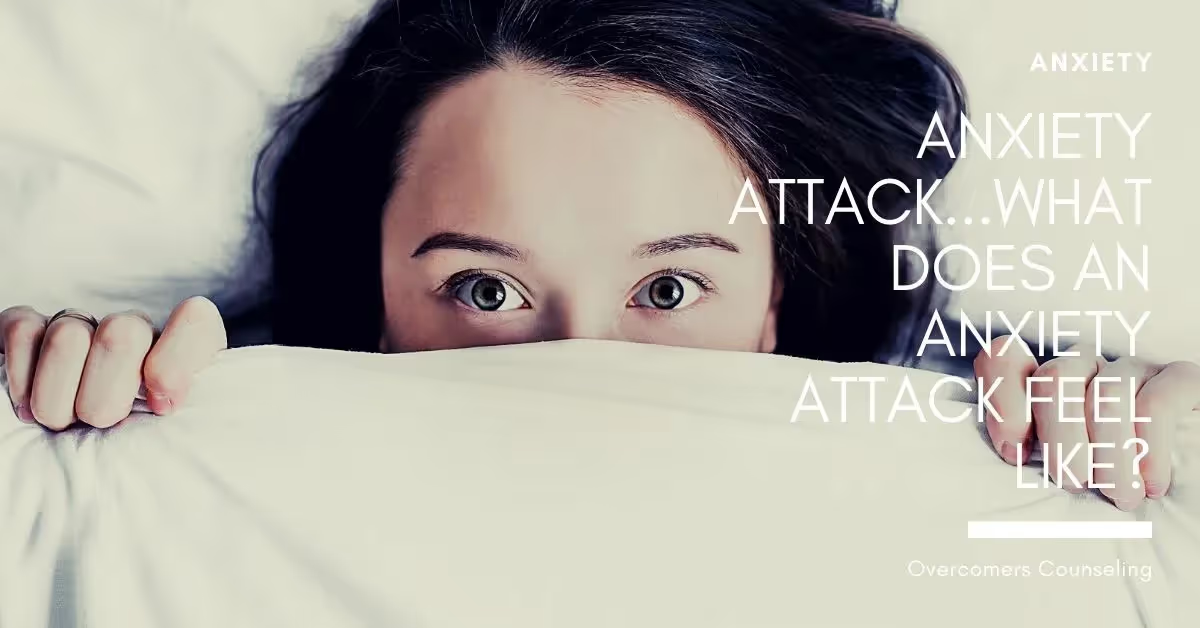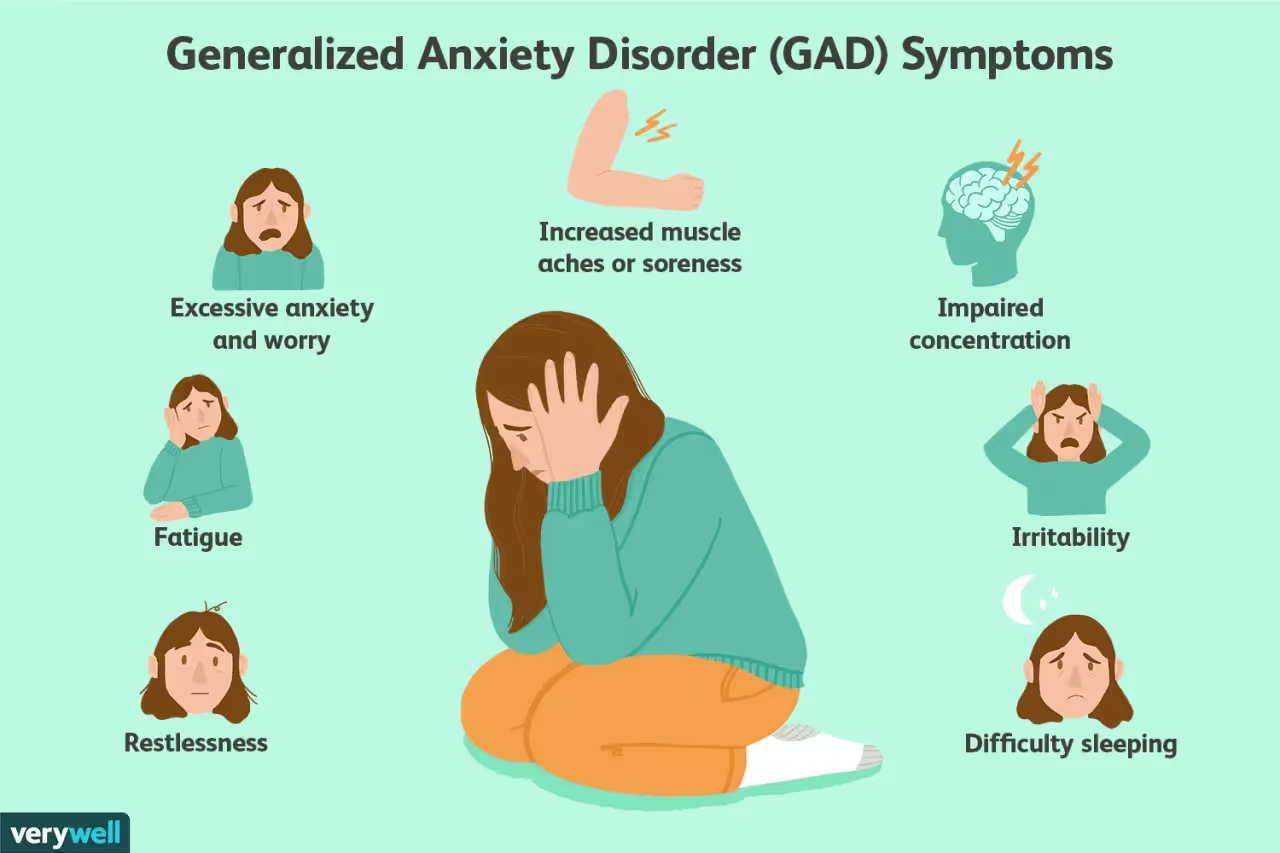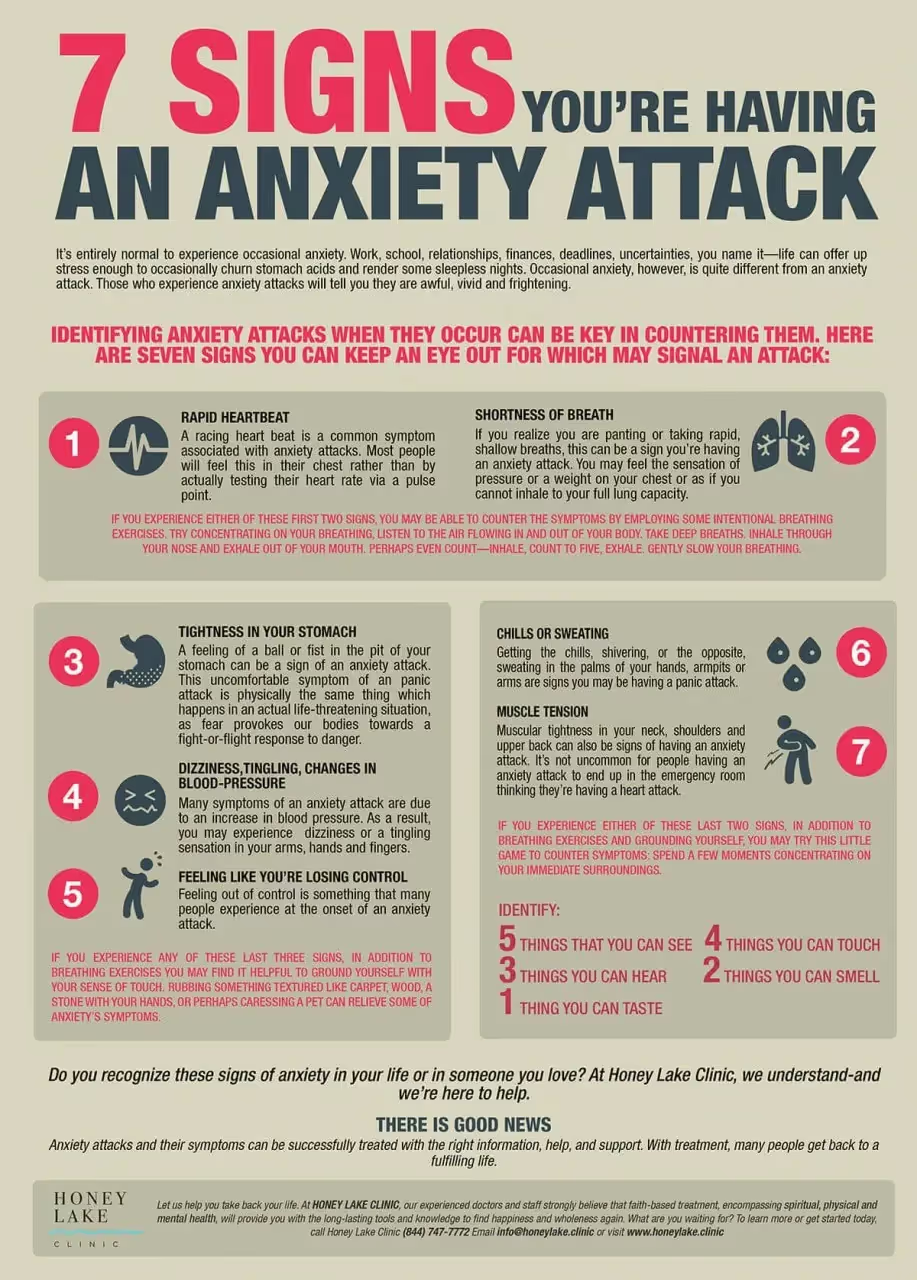Anxiety attacks can be frightening, overwhelming experiences for people who experience them, but what does an anxiety attack feel like exactly?Anxiety...

Anxiety attacks can be frightening, overwhelming experiences for people who experience them, but what does an anxiety attack feel like exactly?
Anxiety attacks often present with a variety of physical symptoms, such as shortness of breath and chest pain. Because of this, many people experiencing an anxiety attack for the first time may seek emergency medical help, as anxiety attacks can often feel like life-threatening health conditions, such as a heart attack.
In addition to this, anxiety attacks are often accompanied by other frightening symptoms, such as a racing heart, excessive sweating, numbness or tingling of the extremities, and a "sense of impending doom".
Anxiety attacks, while extremely distressing to an individual experiencing them, are ultimately harmless.
It is common, however, for those undergoing an anxiety attack to feel as if they are dying, going insane, or losing control of themselves. Because of the severity of these symptoms, it is important to understand exactly what an anxiety attack feels like to understand the distressing nature of this condition.

Source: Verywell
Many anxiety attacks begin with a sensation of not being able to catch one's breath.
This feeling can occur even when an individual is at rest or seemingly calm. Those who experience shortness of breath as a result of an anxiety attack often feel as if they suddenly cannot fully expand their lungs and "get a full breath". As a result, they will often begin to hyperventilate, which leads to further feelings of breathlessness, as well as other symptoms, such as a "pins and needles" sensation in the extremities and feeling as if one is about to faint.
It is important to remember that shortness of breath caused by anxiety is not a result of a lack of oxygen, but rather, a result of too much oxygen due to hyperventilation. Because of this, practicing slow, deliberate breathing techniques is crucial to stopping an anxiety attack.
Another common symptom of anxiety attacks is a racing or rapid heartbeat.
Individuals experiencing an anxiety attack may find their heart rate skyrocketing without any apparent reason. In the midst of an anxiety attack, it is not uncommon for the resting heart rate to reach levels of 120 beats per minute, or even more. This is due to the release of adrenaline that comes with anxiety attacks.
When an anxiety attack begins, the body goes into "fight or flight mode" in an attempt to escape from the perceived threat. The keyword here is "perceived": during an anxiety attack, the mind interprets harmless or benign stimuli as life-threatening, and subsequently creates excessive amounts of adrenaline in an attempt to "protect" the individual from the perceived threat.
One of the more disturbing symptoms of an anxiety attack is a sensation of tingling or numbness that often begins in an individual's fingers, toes, or face and spreads to the rest of the body.
This symptom can be particularly frightening, as it is less common than the others, and may lead the individual experiencing this symptom to believe that they are having a stroke, or some other life-threatening emergency. While tingling and numbness may be startling, it is a well-known symptom of acute anxiety attacks.
Tingling and numbness often occurs as a result of hyperventilation. When a patient begins to overbreathe, excessive amounts of oxygen get drawn into the bloodstream, throwing the ratio of oxygen and carbon dioxide in the blood out of balance. This leads to the feelings of numbness and tingling that often accompany anxiety attacks, as well as an involuntary contraction of fingers that occurs on occasion, known as tetany.
Both of these symptoms, while frightening, are harmless, and go away once the patient is able to return to a normal, slower breathing pattern.
Another common symptom experienced during anxiety attacks is a feeling of choking, or of having tightness in the throat.
This symptom often occurs spontaneously, and can be the triggering symptom for a full-blown anxiety attack. This sensation, when it occurs as a result of anxiety, is known as globus pharyngeus, and is a very common symptom of anxiety.
Individuals with globus pharyngeus may feel as if their throat is partially or fully blocked, despite being able to speak and breathe normally. They may as well feel as if their throat is "tight", and that the muscles in the throat are paralyzed.
These symptoms are often not painful, but may be very uncomfortable to the individual experiencing them. Individuals experiencing globus pharyngeus may likewise report a subjective feeling of difficulty swallowing, despite being able to do so normally.
One of the most distressing and traumatizing symptoms of an anxiety attack is also one of the vaguest and most difficult to identify.
A "sense of impending doom" is a frequent companion to anxiety attacks, and is often the most alarming to an individual experiencing one.
A sense of impending doom is just what it sounds like-- a sudden, unshakeable feeling that something very, very bad is about to happen, and that the individual's life or well-being is in imminent danger.
This sensation can come on without warning and typically lasts no more than 10 minutes (about the average duration of an anxiety attack).
A sense of impending doom is often a cardinal signal of an anxiety attack, and while it may be an immensely frightening sensation, like all symptoms of anxiety, it is ultimately harmless and goes away on its own.

A sense of weakness or faintness is another very common symptom of an anxiety attack, and one that causes many patients who struggle with anxiety excessive amounts of stress.
Patients with anxiety may display an irrational fear of fainting, which is often tied to the fear of losing control that is so common with anxiety disorders. Individuals experiencing an anxiety attack often feel dizzy, lightheaded, and weak, as if their legs are unable to support them. While these feelings are distressing, they are more often than not purely psychosomatic.
In fact, fainting is somewhat less likely to happen during an anxiety attack, as fainting most often occurs due to a sudden drop in blood pressure that prevents blood from adequately reaching the brain for a temporary period. While fainting itself during an anxiety attack is fairly uncommon, however, there are instances where it can occur. Some individuals may experience what is known as a vasovagal syncope, which is a nervous system response to certain distressing stimuli.
While fainting is a frightening symptom for those struggling with anxiety, it is uncommon to experience it as a result of anxiety, and even in instances where this is the case, fainting as related to anxiety attacks are not considered dangerous or life-threatening.
When one experiences an anxiety attack, it is often accompanied by a feeling of "losing control" or of going crazy.
In fact, most symptoms of anxiety are tied back to this feeling of losing control. While symptoms such as these may be extremely distressing to those experiencing them, it is important to note that it is impossible for an individual to "go crazy" from anxiety.
The term "going crazy" is typically applied to a condition known as psychosis, which is a complete or total break from reality, as seen in some psychiatric conditions like schizophrenia or bipolar disorder.
Anxiety creates the opposite problem-- patients suffering from anxiety attacks are, in fact, hypervigilant of the reality around them. While psychosis is known to occur in rare instances of depression, it is not in any way associated with anxiety attacks or disorders. Simply put, nobody has ever "gone crazy" from an anxiety attack, even if it may feel like that is the case.
As with shortness of breath, chest pain is one of the most alarming physical symptoms of an anxiety attack, as it is also a cardinal symptom of life-threatening medical emergencies, such as heart attacks or blood clots.
Chest pain as a result of anxiety often feels indistinguishable from chest pain as a result of a life-threatening condition, and as a result, many patients experiencing anxiety attacks for the first time wind up in the emergency room, thinking they are suffering from something much more serious.
Like all symptoms of an anxiety attack, however, chest pains as a result of anxiety are ultimately harmless. Given the serious nature of chest pain as a symptom, however, a medical examination is often necessary to determine that there is no cause of the pain other than anxiety.

Panic attacks are sudden bursts of intense fear or terror that peak within minutes.
Symptoms can include racing heart, sweating, trembling, shortness of breath, and a feeling of impending doom or loss of control.
Panic attacks tend to occur unexpectedly and may even wake a person from sleep. When these attacks happen repeatedly, it is referred to as panic disorder.
On the other hand, an anxiety attack refers to a feeling of increasing worry, distress, or unease.
Anxiety attack symptoms can vary in intensity, often peaking in response to stressors, and may include restlessness, difficulty concentrating, irritability, and muscle tension.
Persistent and excessive worry characterizes generalized anxiety disorder, one of the most common anxiety disorders.
Here are some key points to distinguish between the two:
Mental health conditions such as post-traumatic stress disorder, social anxiety disorder, obsessive-compulsive disorder, and separation anxiety disorder may also involve elements of anxiety and panic.
A mental health professional can help diagnose these conditions using tools like the Diagnostic and Statistical Manual of Mental Disorders.
It's important to seek treatment to manage symptoms and improve quality of life.
Treatment options may include medications, psychotherapy (such as cognitive-behavioral therapy or exposure therapy), relaxation techniques, and support groups.
Some individuals may also benefit from lifestyle changes, such as regular physical activity and reducing caffeine intake, which can worsen anxiety symptoms.
If you believe you're experiencing anxiety or panic attacks, consider reaching out to a mental health professional.
They can help you understand the differences between anxiety attacks and panic attacks, how long anxiety attacks can last, and how they differ from a nervous breakdown.
They can also provide strategies to manage physical symptoms like back pain from anxiety attacks.
Remember, it's possible to live with high functioning anxiety, and with the right support, you can regain control over your life.
Anxiety attacks are known to produce a wide variety of symptoms, both mental and physical, that can cause individuals who are experiencing them extraordinary feelings of discomfort and distress.
Many who are suffering from an anxiety attack for the first time believe they are dying, or suffering from a serious life-threatening illness, and often seek out emergency medical support as a result, as anxiety attacks share many of the same symptoms with conditions such as heart attacks, strokes, or blood clots. Luckily, modern medical testing has made it very easy to rule out these other, more serious conditions, leaving anxiety as a final explanation for the cause of such distressing symptoms.
The symptoms produced by anxiety attacks vary greatly from person to person, although several symptoms are found to be very common among most who struggle with anxiety. These include physical symptoms, such as shortness of breath, chest pains, excessive sweating, weakness or feeling faint, rapid heart beat (tachycardia), tingling and numbness in the extremities or around the mouth, and a choking sensation or feeling that something is lodged in the throat. Psychological symptoms, meanwhile, often include a sense of impending doom, and a fear of losing control or "going crazy".
Anxiety attacks, while physically harmless, are often greatly disturbing, and may even be traumatic to individuals who experience them.
People who experience an initial anxiety attack may find themselves avoiding certain places associated with the attack. They may limit their social or professional lives in order to accommodate their newfound fear, avoid activities such as driving, and some may avoid leaving their homes altogether.
Anxiety attacks can become disabling in this sense, as the desire to avoid anxiety outstrips all other needs and wants.
While anxiety attacks are extremely distressing, traumatic, and potentially disabling, there is much hope to be had for recovery. Remission rates for anxiety, given the proper course of treatment, are higher than that of any other mental illness, and many patients who once found themselves unable to leave their homes or function normally in day-to-day life are able to do so once again after a course of treatment.
Anxiety counseling is a treatment method and may be required given an individual's unique genetic and environmental makeup, and only a trained professional can determine the proper course of treatment for each given patient.
Tell us what you think, have we missed something? Have you suffered from an anxiety attack? Let us know in the comments.
The duration of anxiety counseling varies for each individual, depending on the severity of their anxiety and their progress in therapy. Our therapists will regularly assess your progress and adjust your treatment plan as needed.
Addressing anxiety is crucial because it can significantly impact your quality of life and overall well-being. Left untreated, anxiety can lead to more severe mental health issues, relationship problems, and difficulty functioning in daily life.
Other activities which have been found helpful in reducing both immediate feelings of anxiousness and long-term anxieties associated with chronic disorders include yoga, journaling, nature walks, art therapy, volunteering, and other low-stress activities. Additionally, developing a healthy lifestyle incorporating adequate sleep, physical activity, and nutritious meals can help reduce overall stress levels.
It's important that you feel comfortable discussing personal matters with your therapist in order to open up and get more out of therapy sessions; therefore finding someone who meets certain criteria like experience level, expertise areas, and personality is key when selecting a therapist who can give meaningful feedback about how best handle issues related to anxiety or other mental health concerns.
To reduce your anxiety, you can practice relaxation techniques such as deep breathing, progressive muscle relaxation, guided imagery, and mindfulness practices. Additionally, regular exercise has been found to be beneficial in managing stress and improving mental health.
Yes, Medicaid provides insurance coverage for therapy services specifically designed to help individuals struggling with anxiety, depression, and other mental health conditions.